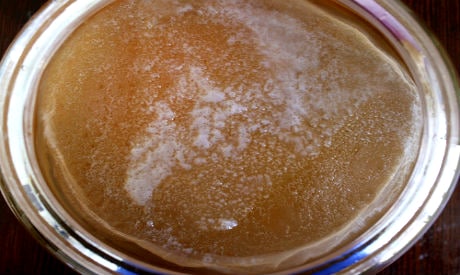
Health-crazed celebrities like Madonna and Gwyneth Paltrow have been spotted sipping kombucha and some are touting it as the next “big thing” in probiotics-but what is this sweet stuff and is it the “cure-all” for a slew of our health woes?
Good question.
Despite now being a $150 million-a-year-plus industry, kombucha-or “booch” as it is so affectionately called-is not a new fad. The ancient fermented tea beverage’s roots date back thousands of years to the Qin Dynasty in 220 BC, before it made its way to Russia by immigrants and eventually found popularity in the 70s among hippie communities.
A fizzy beverage with a Champagne-meets-vinegar flavor, kombucha is made from a combination of tea, sugar, yeast, and bacteria. First, black or green tea is sweetened with sugar, and a special concoction of bacteria and yeast is added. The tea mixture is fermented for about a week in a container, during which the bacteria feasts on the sugar to produce microbes-billions of them actually.
Read more about other fermented drinks to improve your health
The end product is said to be a probiotic crawling with friendly bacteria that, among many things, aid in digestion and strengthen the immune system. Others credit kombucha with healing cystic acne, curing cancer, and turning back the clock to make us youthful again. So, does kombucha deliver on all its health promises?
The answer is simple: nobody really knows.
There is little clinical data of kombucha’s benefits, and what does exist is preliminary. A 2012 study published in the Swiss Society of Food Science and Technology claims that kombucha has antimicrobial, antibacterial, and antifungal effects, which may render it useful in treating yeast infections and other forms of candidiasis. Another Jadavpur University study published in 2012 in Pathophysiology discovered that kombucha could effectively protect liver cells due to its antioxidant qualities. And earlier on in 2003, researchers administered a kombucha tea cocktail to rats with lead acetate in their blood. They found the rats’ immune systems improved, despite suppression from processing the heavy metals in their systems.
On the nay side, there have been reports of illness and death surrounding make-your-own kombucha, as well as a 2010 recall due to several kombucha products containing alcohol levels over the legal limit for a non-alcoholic beverage.
The mind-boggling amount of bacteria found in kombucha has also made it very difficult for scientists to understand whether the end result only contains “good” bacteria. One of the more popular and recognizable brands on shelves, GT’s Kombucha, claims that tests show its products contain at least two important strains of good, friendly bacteria.
Regardless, many are confident that the tea concoction has healing powers. Ask someone and they may report better sleep habits, fewer colds, and clearer skin. Ask someone else and they may just tell you it simply tastes good (or bad). Read more about sleep deprivation
For now, the consensus is similar to that of other debates surrounding the claims of rising health trends and super foods: If it makes you feel good, then it’s doing its job.
Photo Credit: thedabblist










